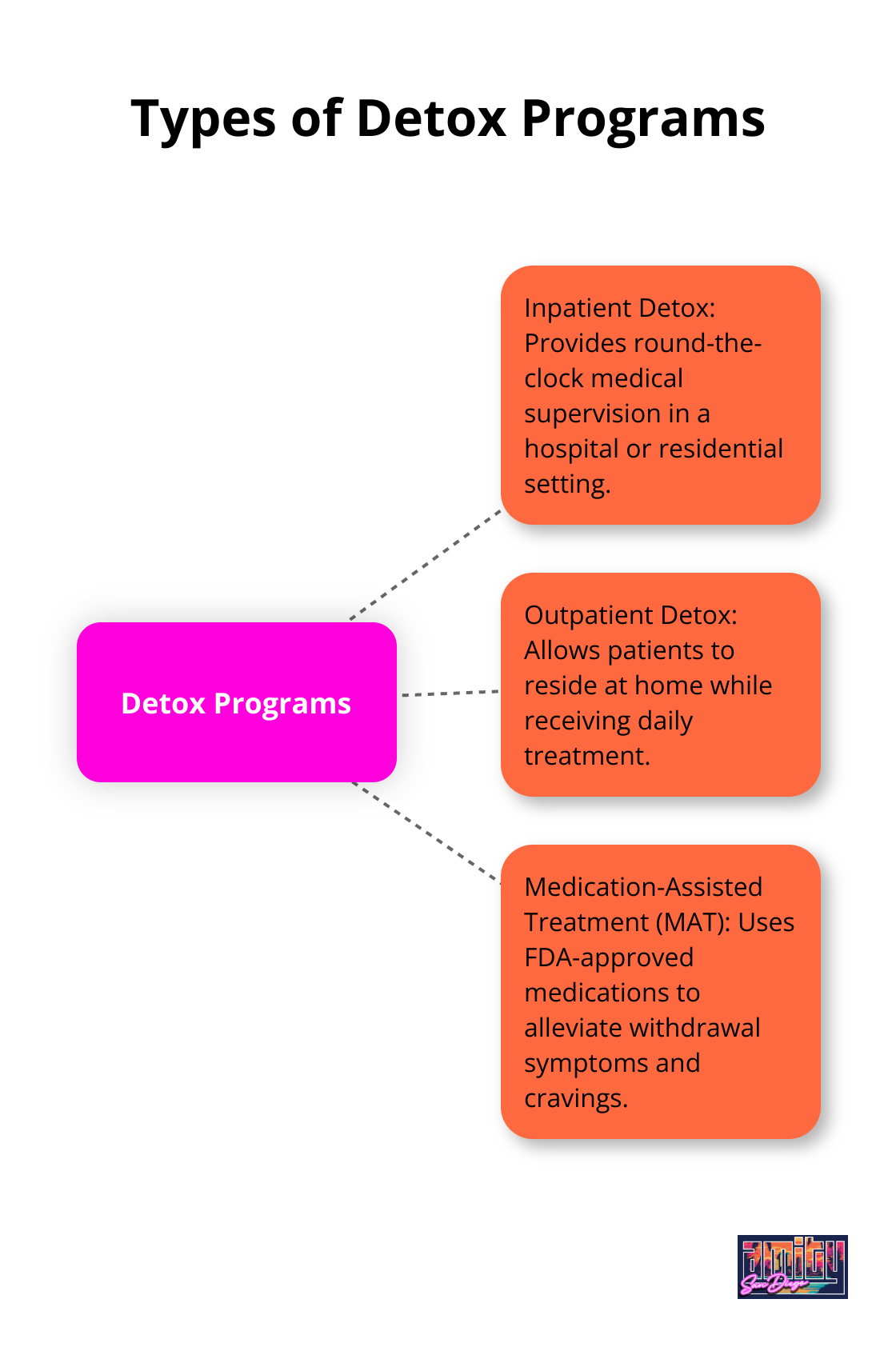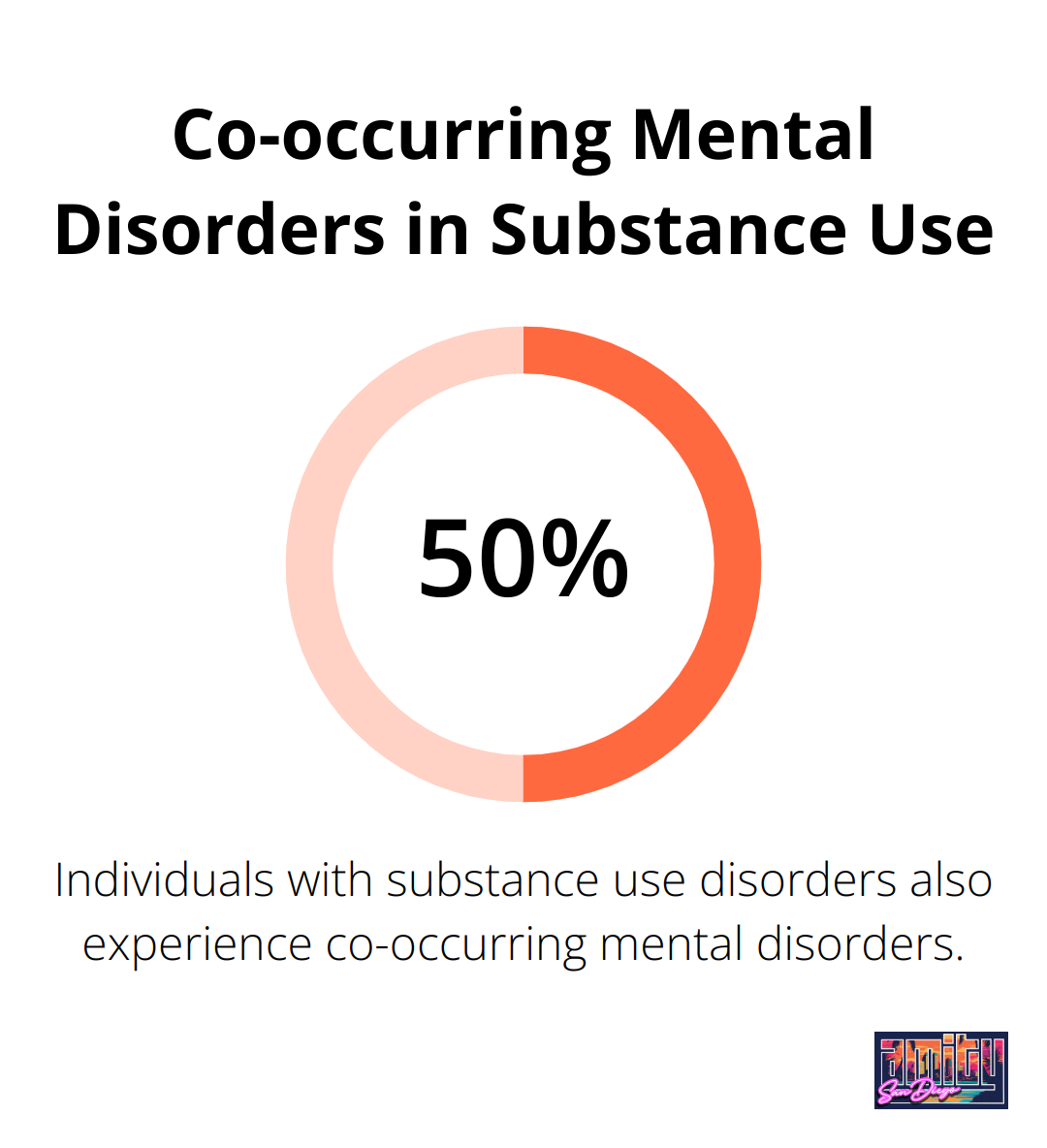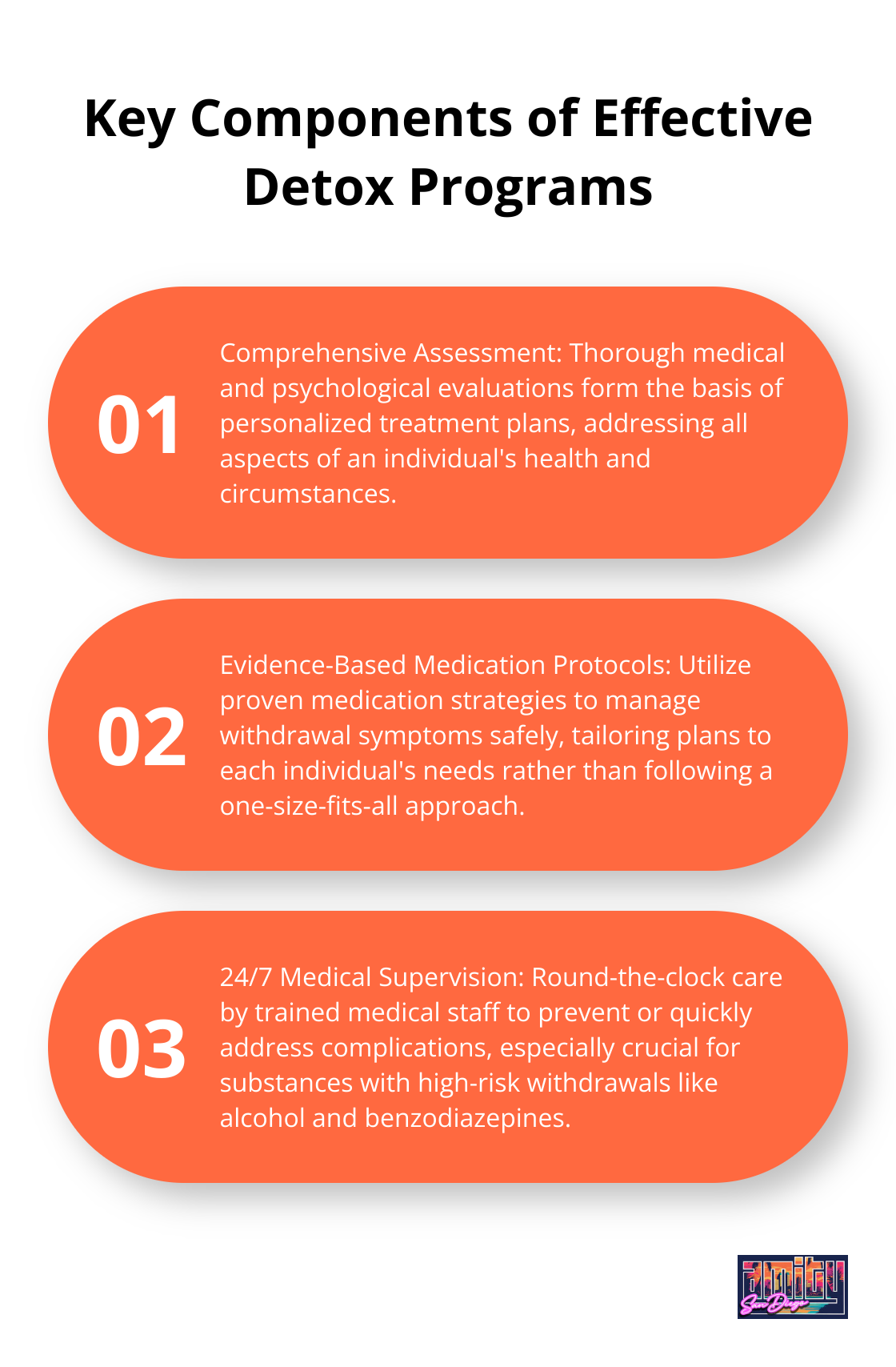Choosing the right detox program is a critical first step on the path to recovery. At Amity San Diego, we understand the importance of this decision and its impact on long-term success.
A well-designed detox program provides a safe, medically supervised environment for individuals to overcome physical dependence on substances. This blog post will guide you through the key factors to consider when selecting a detox program that best suits your needs.
What Is Medical Detox? Understanding the Foundation of Recovery
The Science Behind Medical Detoxification
Medical detoxification forms the cornerstone of addiction recovery. This process removes toxic substances from the body under professional care. The primary audiences for this TIP include substance abuse treatment counselors, administrators of detoxification programs, and Single State Agency directors.
Types of Detox Programs Available
Several detox program options exist:

- Inpatient Detox: Provides round-the-clock medical supervision in a hospital or residential setting.
- Outpatient Detox: Allows patients to reside at home while receiving daily treatment.
- Medication-Assisted Treatment (MAT): Uses FDA-approved medications to alleviate withdrawal symptoms and cravings.
Methadone, buprenorphine (known as Suboxone when combined with naloxone), and naltrexone (known as Vivitrol) are the three FDA approved drugs that have been shown to be effective for MAT.
The Importance of Professional Supervision
Professional supervision during detox is essential. The National Institute on Drug Abuse emphasizes that medically managed withdrawal can prevent potentially life-threatening complications. Trained medical staff:
- Monitor vital signs
- Administer medications to ease discomfort
- Provide emotional support
- Intervene in case of emergencies
Tailoring Detox to Individual Needs
Each person’s detox experience is unique. Factors such as substance used, duration of use, and overall health influence the detox process. A study found that detoxification does not serve as standalone care for substance dependence. Rather, detoxification should function as an entry point to addiction treatment.
Thorough assessments (often including physical exams and psychological evaluations) create personalized detox plans. While not all facilities offer detox services directly, many guide clients to trusted partners who provide top-tier medical detoxification.
The journey to sobriety doesn’t end with detox. A comprehensive treatment plan following detox is essential for long-term recovery. The next chapter will explore the critical factors to consider when choosing the right detox program for your unique needs.
What Factors Matter Most When Choosing a Detox Program?
Medical Care and Monitoring
The level of medical care required varies depending on the substance and severity of addiction. Alcohol and benzodiazepine withdrawal can be life-threatening, necessitating 24/7 medical supervision. The best-studied benzodiazepines for AW treatment are diazepam, chlordiazepoxide, and lorazepam.
When evaluating programs, ask about:
- The qualifications of the medical staff
- Availability of emergency medical services
- Protocols for managing severe withdrawal symptoms
Substance-Specific Expertise
Different substances require different approaches to detox. Opioid detox often involves medication-assisted treatment (MAT) to manage withdrawal symptoms and cravings. Three medications currently approved by the U.S. Food and Drug Administration (FDA) for opioid use disorder treatment are methadone, buprenorphine, and extended-release naltrexone.
Programs with experience in treating your specific substance use disorder should offer evidence-based protocols tailored to your needs.
Addressing Co-occurring Mental Health Conditions
About half of individuals who experience a substance use disorder during their lives will also experience a co-occurring mental disorder and vice versa (according to the National Institute on Drug Abuse). Integrated treatment is crucial for individuals with dual diagnosis and addiction as it leads to better outcomes and quality of life.

Seek out facilities that offer:
- Comprehensive mental health assessments
- Integrated treatment plans
- Access to psychiatric care
Program Duration and Intensity
Detox programs can range from a few days to several weeks, depending on individual needs. Research shows that longer treatment durations associate with better outcomes. The National Institute on Drug Abuse recommends a minimum of 90 days of treatment for most individuals.
Consider your personal circumstances, work obligations, and support system when deciding between inpatient and outpatient options. Detox is just the first step – a solid aftercare plan is essential for long-term recovery.
Aftercare and Continuing Support
The transition from detox to ongoing treatment is a critical period. Programs that offer seamless integration with continuing care services can significantly reduce the risk of relapse. A study published in the Journal of Substance Abuse Treatment found that individuals who engaged in aftercare were 10 times more likely to maintain sobriety at a one-year follow-up compared to those who didn’t.
Try to find programs that:
- Provide comprehensive discharge planning
- Offer alumni support groups
- Facilitate connections with community resources
Choosing the right detox program is a personal decision that should involve consultation with healthcare professionals. The next section will explore the key components that make a detox program effective, helping you identify the elements that contribute to successful recovery outcomes.
What Makes a Detox Program Truly Effective?
At Amity San Diego, we’ve observed the elements that distinguish exceptional detox programs. The most effective detox programs incorporate key components that establish a foundation for long-term recovery success.

Comprehensive Assessment: The Cornerstone of Personalized Care
A thorough evaluation forms the basis of effective treatment. Top-tier programs conduct in-depth medical and psychological assessments before treatment initiation. This step shapes the entire detox process.
The American Society of Addiction Medicine (ASAM) recommends assessment of acute intoxication and withdrawal potential as one of the key dimensions. This approach ensures treatment addresses all aspects of an individual’s health and circumstances.
Evidence-Based Medication Protocols: Science-Backed Relief
Effective detox programs utilize proven medication protocols to manage withdrawal symptoms safely. Research has shown that buprenorphine is more effective than non-opioid, clonidine-based medically supervised withdrawal for managing opioid withdrawal symptoms.
Premier programs stay current with the latest research and adjust their protocols accordingly. They tailor medication plans to each individual’s needs rather than following a one-size-fits-all approach.
24/7 Medical Supervision: Prioritizing Safety
Round-the-clock medical care is essential in high-quality detox programs. The risk of complications during withdrawal can be significant, especially for substances like alcohol and benzodiazepines.
Research indicates that alcohol withdrawal delirium (AWD) or delirium tremens (DT) is associated with severe complications and high mortality. Constant monitoring by trained medical staff can prevent or quickly address such complications.
Holistic Comfort Measures: Supporting the Whole Person
While medical interventions play a vital role, the most effective programs also incorporate holistic therapies to enhance comfort and promote healing. These might include:
- Nutritional support to replenish depleted nutrients
- Mindfulness practices to manage stress and anxiety
- Physical activities to boost endorphins and improve sleep
Seamless Transition to Ongoing Care: Bridging the Gap
The best detox programs view their role as the first step in a longer journey. They actively prepare clients for the next phase of treatment, whether that’s residential care, intensive outpatient programs, or other forms of ongoing support.
Effective programs don’t just focus on getting you through withdrawal – they set you up for long-term success by ensuring a smooth handoff to the next level of care.
Final Thoughts
Selecting the right detox program impacts your recovery journey significantly. Medical care, substance-specific expertise, and addressing co-occurring mental health conditions are key factors to consider. The duration, intensity, and aftercare support also play vital roles in long-term success.
Effective detox programs share common elements that set them apart. These include comprehensive assessments, evidence-based medication protocols, and round-the-clock medical supervision. A seamless transition to ongoing care ensures that the progress made during detox continues into the next phases of treatment.
At Amity San Diego, we offer personalized, medically supervised care for addiction recovery. Our team provides compassionate support throughout the process, including outpatient services such as Partial Hospitalization (PHP) and Intensive Outpatient (IOP) programs. If you need addiction treatment in San Diego, reach out to us for professional help and start your journey to lasting recovery today.

